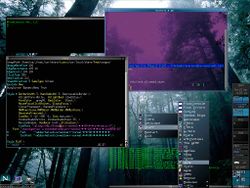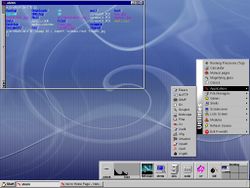FVWM
| This Piss is Being Reviewed.
This article is incomplete, but help is on the way. Please don't put it up for VFD or QVFD or slap any other maintenance templates on it until the
Also don’t even think about slapping an ICU on it. Help this page by leaving comments for its author on its talk page or on the article's entry in Pee Review. |
|||
FVWM, variously called the Feeble Virtual Window Manager, or Frigged-up Velcro Waste Machine, but most people simply like to fill in their own F-word in a way that describes the window manager to their tastes and emotions.
Design Philosophy[edit | edit source]
This window manager was created to run on top of an X-Windows server in a UNIX environment.
While windowed systems had been around for some time, by the early 90s, it was thought that icons had magical properties and pointed the way to technological progress in the future. Toolbars and icons were just the ticket to success, and if you can cram weird features into icons and taskbars you can make it do weird things, like contain a clock, or an xbiff process, or even a console. Maybe even the entire Corel Office 2000 suite can be made more compact and convenient if it was sucked into a section of a taskbar which moved out of the way when you lost the SloppyFocus by moving the mouse to the desktop area. That last feature had to be cancelled since the Corel CEO lost an arm wrestling match to the Microsoft CEO.
FVWM is one step above TWM in terms of user friendliness and delirious mass-market popularity.
History[edit | edit source]
FVWM was just about to take over the computing world by storm, when Rob Nation misplaced the CD-ROM containing the code of a brand new FVWM version he was just about to upload to the GNU archive back in 1995. People had to subsist on updating and debugging the version 1 code at the time, until Mr. Nation, one year later, found the CDs behind the couch. By that time, Windows-95 had caught the imagination of the ordinary user, FVWM-95, which was the next incantation of FVWM, was left behind playing catch-up, as if it were the "Johnny-come-lately".
FVWM-95[edit | edit source]
Windows-95 is an obvious ripoff of FVWM-95, which had now been reduced to simply attracting new users away from MS Windows with its similar interface. FVWM is credited with inventing a narrow-profile taskbar that allowed the user to turn off the computer by first pressing on a button called "Start". Early on, they noted it as a bug, but since this attracted new users to FVWM from Windows, it became a feature.
It would take hours of work to coax the look and feel you wanted from fvwm or its descendants. These days, you need to be able to coordinate several configuration scripts, which cannot be reconciled completely by their Braindead Configuration Tool (seriously, that was the name).
FVWM-2[edit | edit source]
FVWM-2 comes after FVWM-95, and is the current version. You can do more neat things with icons than ever before. The current version is extremely hard to configure, requiring having to know the language for a preprocessor as well as the script itself. Isn't that just uber-geeky? I knew you'd like it. You can currently swallow an xconsole in a button bar. We shall see a "Version 3" of FVWM the minute someone figures out how to swallow a blu-ray app into a taskbar icon.
Bug tracking[edit | edit source]
One of the FVWM man pages had this in its BUGS section (not certain if this is attributable to Rob Nation):
- Initially there were exactly 71.8 unidentified bugs. Since then 22.825 bugs have been fixed. Assuming that there are at least 10 unidentified bugs for every identified one, that leaves us with unidentified bugs. If we follow this to its logical conclusion we will have an infinite number of unidentified bugs before the number of bugs can start to diminish, at which point the program will be bug-free. Since this is a computer program if you don't insist on double-precision. At the current rate of bug discovery we should expect to achieve this point in years. I guess we better plan on passing this thing on to our children...
It is likely that we are not quite at the peak of this bug distribution curve yet ...
See Also[edit | edit source]





